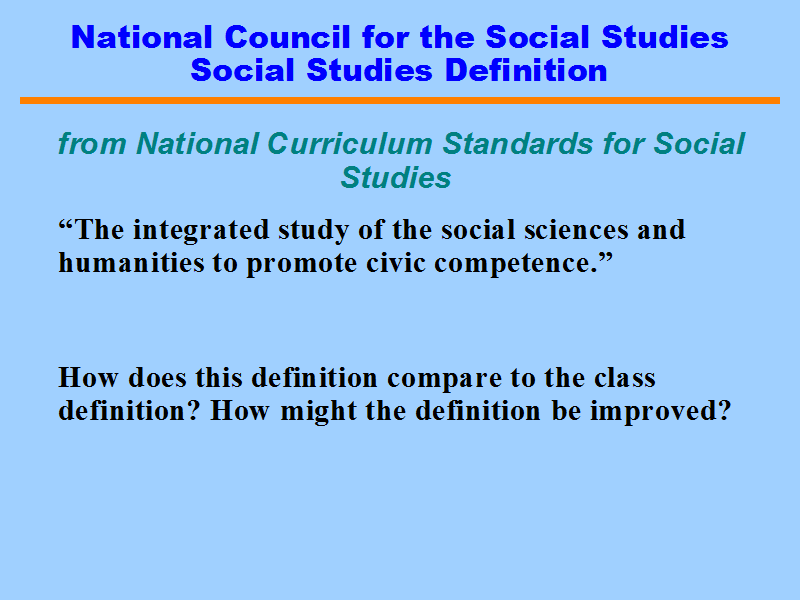

In the early 1940s, Paul Hanna articulated the Expanding Communities approach as the vehicle in elementary education by which teachers could best present social studies knowledge. As phrased in the curriculum guidelines released by the NCSS (1979), "the basic goal of social studies education is to prepare young people to be humane, rational, participating citizens in a world that is becoming increasingly interdependent" (p.262).Įlementary social studies. Personal development has traditionally received the greatest emphasis at the elementary level at the high school level, methods of inquiry have received more emphasis. At all levels, however, the goals of social studies have been characterized by Peter Martorella (1985) as: (1) transmission of the cultural heritage (2) methods of inquiry (3) reflective inquiry (4) informed social criticism and (5) personal development. Although social science typically refers only to academic disciplines such as anthropology, sociology, psychology, geography, economics, and political science, the term social studies includes the aforementioned social sciences as well as humanities disciplines like history, American studies, and philosophy.Īt the elementary grade level, social studies is typically organized and taught in an integrative and interdisciplinary fashion, but by the high-school-level social studies teaching and learning are organized by courses in the academic disciplines. Social studies is the preferred term in part because it is more inclusive. The terms social studies education and social science education are often used interchangeably and are, at times, a source of confusion. The Role of Social Studies in the Curriculum of U.S. What began as a service organization intending to close the gap between social scientists and secondary school teachers soon advanced an integrated study of the social studies and a broader conception of social studies education. Indeed, citizenship education was one of the main missions of the National Council for the Social Studies (NCSS) when it was formed in 1921. As World War I raged in Europe, social studies courses were viewed as a means of developing patriotism among the new foreign-born citizens. At the time, because of increased immigration from non-English speaking countries, educators were given the task of teaching English and "the American way of life" in addition to their content areas. The emphasis on citizenship development was understandable. This course, called social studies, would have as its main goal the cultivation of good citizens. Social studies received further support when the 1918 Cardinal Principles of Secondary Education called for the unified study of subject areas heretofore taught in isolation. When the NEA 1916 report established social studies as the name of the content area, it presented the scope and sequence that is still in use at the start of the twenty-first century. By 1916 the National Education Association (NEA)'s Committee on the Social Studies was urging that an interdisciplinary course of instruction be created based on the social sciences.

There were indications that change was coming when the 1893 Report of the Committee of Ten on Secondary School Studies advocated an interdisciplinary approach in the social studies.


 0 kommentar(er)
0 kommentar(er)
